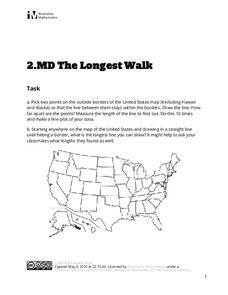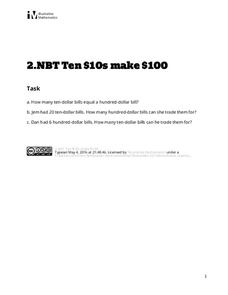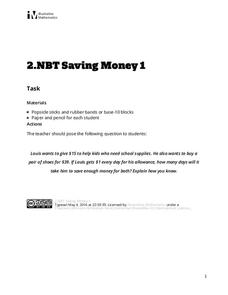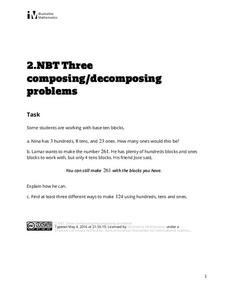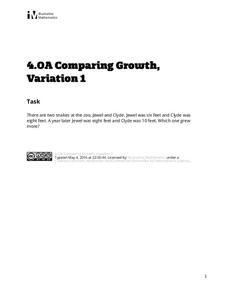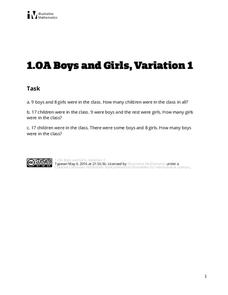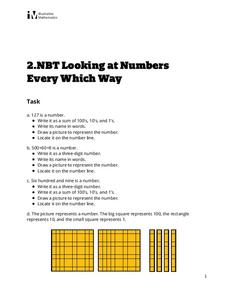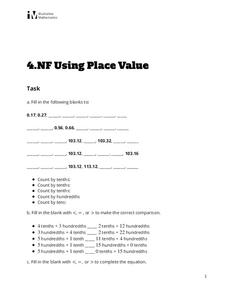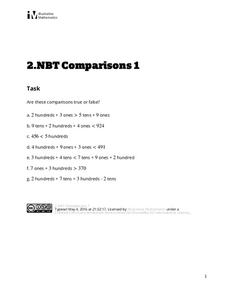Illustrative Mathematics
The Longest Walk
How long of a line can you draw within this activity? Learners pick two points outside and within the map to create the longest line they can. After drawing 10 lines, learners plot the length of each line on a line plot. Then they...
Illustrative Mathematics
Comparisons 2
Need a quick review for greater than or less than? Young mathematicians use <, >, or = to complete a set of seven comparison number sentences.
Illustrative Mathematics
Making a Ten (Grade 1)
How many ways can first graders make a 10? Using an addition chart, learners color in the 10s on the table. They notice and explain the meaning of the pattern, and how to get to another sum of 10.
Illustrative Mathematics
What is 23 ÷ 5?
Twenty-three divided by five can have a different value depending on the unit of measurement being asked. Learners problem solve 23 divided by 5 in a series of five word problems.
Illustrative Mathematics
Ten $10s Make $100
If ten $10s make $100, then how much money do twenty $10s make? Young bankers find the number of bills required to make base ten amounts in three different word problems.
Illustrative Mathematics
Growing Bean Plants (Grade 2)
After planting a bean seed in a jar, young scientists observe the growth patterns over several days. As the bean becomes a sprout, and the sprout becomes a plant, partners measure and plot the data. They notice patterns, practice...
Illustrative Mathematics
Saving Money 1
How many days will it take Louis to save enough money for school supplies and new pair of shoes? Focus on Common Core math standards with a two-part task that involves a word problem and counting manipulatives.
Illustrative Mathematics
Three Composing/Decomposing Problems
Practice composing and decomposing numbers in base-ten using three word problems. Each problem presents a different scenario requiring learners to explain their thinking, find the number of ones, and find out different ways to make a...
Illustrative Mathematics
Counting Stamps
Stamps come in sheets, strips, and singles. Young mathematicians use their knowledge of hundreds, tens, and ones to determine how many stamps Mike has altogether.
Illustrative Mathematics
Multiples of 3, 6, and 7
What are the common multiples of three, six, and seven? Assess young mathematicians ability to find the common multiples of three numbers in a straightforward math task.
Illustrative Mathematics
Comparing Growth, Variation 2
A twist on the first variation of the growth task, this task poses an argument on two explanations of which snake grew more, based on the idea that two is a larger part of six rather than 10.
Illustrative Mathematics
Comparing Growth, Variation 1
Young mathematicians compare the growth of two snake lengths in feet over one year in a straightforward word-problem task.
Illustrative Mathematics
Boys and Girls, Variation 2
How many ways can you make the number 9? Use a task that has pupils thinking about the many different ways a classroom of nine can be made up of boys and girls.
Illustrative Mathematics
Boys and Girls, Variation 1
Given a certain amount of boys and certain amount of girls, how many children are there total in the class? Assess learners' ability to use addition and subtraction strategies when solving word problems.
Illustrative Mathematics
The Pet Snake
Assess how long the class pet snake grew and how long it was when it started growing with a short worksheet. Learners use addition and subtraction strategies with measurements to answer three questions.
Illustrative Mathematics
Karl's Garden
Whose garden is bigger? Assess your class with the area task of finding out if Karl or Makenna's garden is bigger in area.
Illustrative Mathematics
Multiples of Nine
Which numbers are multiples of 9? Task class members to find the first ten multiples of 9 in a straightforward assessment worksheet.
Illustrative Mathematics
Looking at Numbers Every Which Way
Assess class members' ability to look at numbers every which way. A helpful worksheet contain four tasks, including writing numbers as a sum of 100's, 10's, and 1's, and drawing a picture to represent the number.
Illustrative Mathematics
Using Place Value
Learners count by tenths, hundredths, or tens in a task that uses decimal place value strategies. The young mathematicians then use <, >, or = to make correct comparisons between expanded decimal notations.
Illustrative Mathematics
Comparisons 1
A seven question worksheet asks learners to use place value strategies to decide if each number comparison is true or false.
Illustrative Mathematics
Making 124
How many ways can you make the number 124 using only tens and ones? Use a task that prompts young mathematicians to make 124 in as many ways as possible.
Illustrative Mathematics
Double Plus One
Practice doubling with a straightforward worksheet. Learners double plus one each number in the table, and then answer a series of hypothetical math equations.
Illustrative Mathematics
Expanded Fractions and Decimals
Complete the table by writing mixed numbers in expanded fraction and decimal notation. A versatile resource is a great addition to your fourth grade curriculum!
Illustrative Mathematics
Peaches
Subtracting mixed numbers is easy when the fractions have the same denominator. Here, young mathematicians are prompted to find out how many pounds of peaches are left after Alfredo gives some pounds to his neighbor.


